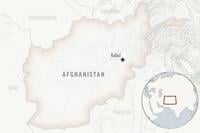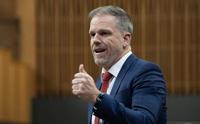CAIRO (AP) — Egypt's and Greece's foreign ministers met Sunday in Cairo following controversial maritime and gas deals that their shared rival Turkey signed with a Libyan leader, officials said.
Cairo and Athens have strengthened ties in recent years, including cooperation in developing energy resources, combating terrorism, and signing new maritime border agreements with Cyprus.
At a joint news conference, Foreign Minister Nikos Dendias said talks with his Egyptian counterpart, Sameh Shukry, focused on the memorandums of understanding between Turkey and Abdul Hamid Dbeibah, the leader of one of two competing governments in divided Libya. He said such agreements were a threat to regional stability.
The deals, signed last week in the Libyan capital of Tripoli, include the joint exploration of hydrocarbon reserves in Libya’s offshore waters and national territory.
Dendias slammed the deals as illegal, saying they infringed on Greek waters.
“Turkey seeks to take advantage of the turbulent situation in Libya in order to further destabilize the Mediterranean region and establish regional hegemony,” He said. “No one can ignore geography. No one can create a virtual world.”
The Egyptian foreign minister, meanwhile, said Dbeibah's government has no authority to conclude such deals, given that its mandate expired following Libya's failure to hold nationwide elections in December last year.
He called for the U.N. to take “a clear position” on the legitimacy of Dbeibah’s government, saying the international body “should not keep silent.”
Dendias said the two ministers also discussed developments in the Aegean Sea, in reference to tensions with Turkey over the alleged deployment of dozens of U.S.-made armored vehicles by Greece to the Aegean islands of Samos and Lesbos.
There were no immediate comments from Turkey or Dbeibah's government.
Libya has been mired in chaos since a NATO-backed uprising toppled and killed longtime dictator Moammar Gadhafi in 2011. The country has been ruled by rival governments for most of the past decade. There are now two administrations claiming legitimacy: Dbeibah’s in Tripoli and another parliament-appointed government chaired by Prime Minister Fathi Bashagha.
Jalel Harchaoui, a Libya expert with the Royal United Services Institute, a defense and security think tank, said Turkey’s deals with Dbeibah’s government, which have “little legal value,” were meant to provoke Greece.
The agreements were “part of the politics of hyper-nationalistic assertiveness that a weak, unpopular" President Recep Tayyip Erdogan is pursuing ahead of June 2023 elections, he said.
Erdogan’s government exploited Dbeibah’s weakened position after Turkey helped him defend his position in Tripoli during that were part of Bashagha's efforts to install his government in the capital, Harchaoui said. Turkey has troops and allied Syrian mercenaries on the ground in the Libyan capital.
The Libyan prime minister defended the deals, saying they would help the North African country pursue oil and gas exploration “in our territorial waters with the help of neighboring countries.”
Turkey’s agreements with Dbeibah’s government came three years after another controversial agreement between Ankara and a former Tripoli government. That 2019 deal granted Turkey access to a contested economic zone in the gas-rich eastern Mediterranean Sea, fueling Turkey’s pre-existing tensions with Greece, Cyprus and Egypt over drilling rights in the region.










































